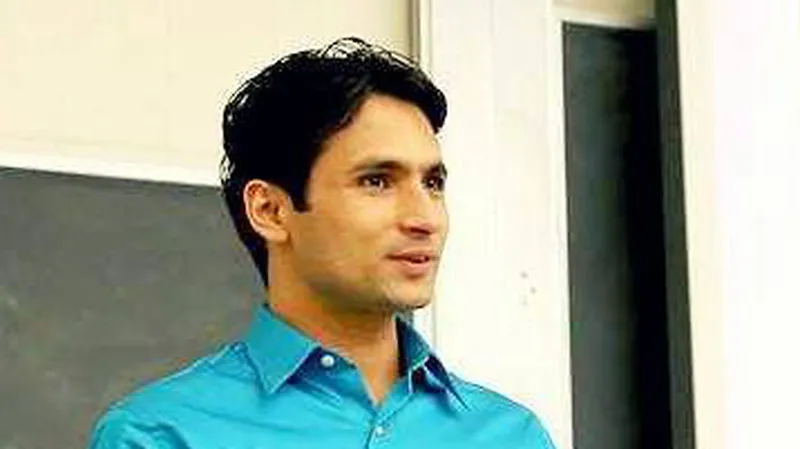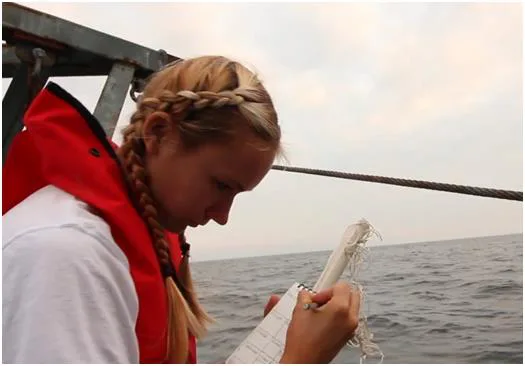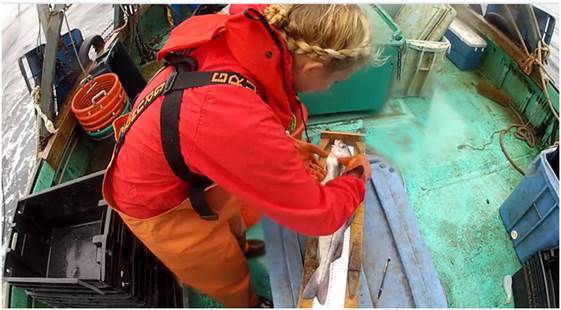
By: Hemanta Kafley, PhD candidate
Alumni Profile: Aubrey Ellertson

Name: Aubrey Ellertson
Education: BA, Biology, Franklin and Marshall College
SFS Program: TCI Spring ’10
Current Position: NOAA Northeast Fisheries Observer Program; Data Editor
Since I completed my SFS program in 2010, I have been back to visit South Caicos several times. My most recent trip was February 2015, where I presented about being a Northeast Fisheries Observer for NOAA, and how to pursue a career in fisheries.
When I graduated from college, I was hired as an at-sea monitor and northeast fisheries observer. I was one of about 200 observers in NOAA’s Northeast Fisheries Observer Program, and one of nearly 1,000 observers nationwide. My job was to keep a record of everything that was brought on board the fishing boat, and everything that left it. In addition, I would document bycatch if there were any, location of catch, the weather, and ocean conditions. The data I collected helped scientists monitor the movement of fish in response to changing environmental conditions.
Essentially I was trying to paint as complete a picture as possible, so that scientists could tell how each fish population was doing. I worked mainly on trawlers and gillnetters, and the trips I covered lasted anywhere from one day to two weeks. Out in the field my goal was to promote strong scientific backing, high data quality standards, objectiveness in collecting information, respect for the fishing community, and a high regard for all marine resources. As an observer I learned to work together, exercising open communication and cooperation to successfully achieve my objective.
The observer/captain relationship can be a delicate one, since taking an observer is a mandatory requirement and fishing permit obligation. As a result, I had to adapt to every boat I went on, and ensure that I was able to do my job successfully without interfering with fishing operations. Working as an observer taught me to be an effective communicator and listener.
Presently I am working as a Data Editor, working to maintain records on 11 of my individual fisheries observers and to track their performance. I review their raw electronic data, and paper logs for completeness and accuracy. I then contact each of my fisheries observers to verify inconsistencies, to try and solve any data quality issues that might arise, and to verify and check their species identification photos they submit. I also check in age samples (otoliths (ear bones), scales, and monkfish vertebrae). In addition to my every day responsibilities, I am very involved in the outreach department within the Northeast Fisheries Observer Program. I travel often for our kiosk outreach events, as well as visit different fishing ports to do dock work and educate fishermen about our program, or about new protocols that are coming into place.

Without a doubt, I would not be where I am today if it was not for SFS and my experiences in Turks and Caicos. While on South Caicos, my research was on establishing a baseline information guide for fisheries management on the finfish dock landings, and in particular if Nassau grouper were being speared below the age of sexual maturity. This experience was particularly important to my growth and development because it was my first opportunity to interact with fishermen in what I would consider a male-dominated society. I gained a lot of field experience, but also how to communicate effectively.
I have enormous ties to the fishing community on South Caicos, and I continually feel a very strong connection to the individuals that made their livelihoods from the sea. Those experiences contributed to my current involvement in New England fisheries, and to my work as a fisheries observer out on commercial fishing boats.
When I visited the Center in February 2015, I had the opportunity to go gillnetting for lemon sharks, and it was truly a remarkable experience I will never forget! I was also able to snorkel the new lobster casitas (houses), and check for juvenile lobsters. I was glad to see that community engagement is as important as ever, and that the time students spend with community members has actually increased.
Lastly, I came home with a potcake this trip! Potcakes are the name given to dogs of the Bahamas and Turks and Caicos Islands. It came about because the locals fed the caked remains of the cooking pot to the dogs. They are truly a remarkable breed both smart, loyal and loving pets. I would never have had Savannah today if not for the help of SFS staff at the Center, and Potcake Place in Providenciales.
Related Posts

Reuniting with Tanzania: Eric Walsh’s “Reunion Flag” Keeps the Spirit Alive

Restoration on a Cinder Cone: A Syntropic Story
